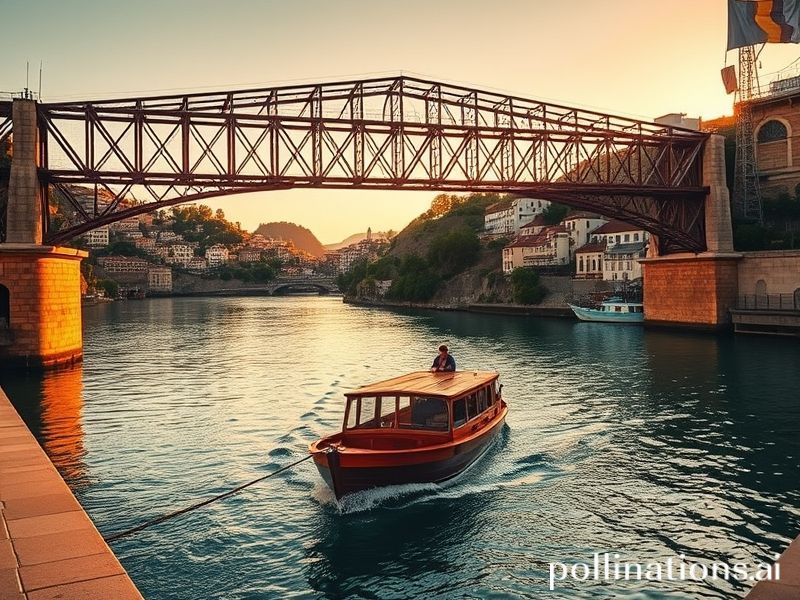porto
Porto: Europe’s Forgotten Belle Finds New Suitors—Again
By our correspondent, still nursing an espresso and a grudge in the Ribeira
They arrive in droves now—Singaporean venture scouts, Californian angel investors, Berlin art-school dropouts with a blockchain for bacalhau—descending on Portugal’s second city like bargain hunters who’ve just heard the outlet mall is giving away free irony. Once upon a late-20th-century hangover, Porto was the place you flew to when Lisbon was full and your budget Ryanair ticket said “close enough.” Today it hosts Web3 summits in 18th-century palaces where the Wi-Fi password is “Salazar1933,” just dark enough to make the Texans tweet about European edginess.
Global capital has a short memory and a shorter attention span, so Porto’s renaissance is already being rebranded as the “Next Berlin,” a phrase that here translates roughly to “rents will triple before the paperwork’s dry.” UNESCO still lists the old town as a World Heritage site; Airbnb lists it as 437 charming lofts with original azulejos and artisanal anxiety. The locals, who perfected the art of shrugging centuries before shrugging was cool, now shrug in five languages and charge admission for the view.
From a macro perch, Porto’s moment is less about pastel facades and more about the planetary migration of money searching for the last pockets of authenticity that can still be leveraged. While Silicon Valley burns another billion on metaverse real estate, Porto offers the tangible kind: granite, gravity, and the faint smell of tidal decay. The same Gulf Stream that once carried British port merchants up the Douro now ferries digital nomads clutching laptops like rosaries, praying the next Zoom call doesn’t reveal the 800-year-old sewage system gurgling under their standing desk.
The city’s port wine lodges—those cathedral-sized tasting rooms where polite Canadians learn the difference between tawny and “I no longer remember my ex’s surname”—have become unlikely classrooms for geopolitical metaphor. Every barrel is a tiny sovereign wealth fund, maturing at 2% angel’s share per year, which is still better performance than most pension plans. Meanwhile, Chinese conglomerates quietly buy quintas the way other people buy NFTs: for the bragging rights and the plausible tax efficiency.
Climate change, ever the uninvited dinner guest, has nudged Bordeaux’s heat index toward barbecue territory, pushing viticultural ambition northward. The Douro Valley is now a hot-weather hedge fund, planting heat-resistant Touriga Nacional like preppers planting beans. If the Antarctic shelf collapses faster than your crypto portfolio, at least there will be decent vintage to drown the sorrow—assuming there’s anyone left who can still afford the corkage.
Back in the city, the trams still rattle like emphysemic tubas, defying EU safety directives with Iberian swagger. Tourists film them for TikTok, unaware the same line carried troops in 1974 when the Carnation Revolution decided fascism was so last season. History here isn’t preserved; it’s re-inflated every morning by municipal workers who know that memory, like bacalhau, improves after a few salty soakings.
And yet, for all the cynicism money can buy, Porto retains a stubborn talent for self-sabotage. Plans for a glistening cruise terminal were recently thwarted when someone remembered the river also hosts the annual Regatta of Rabelo Boats, a floating homage to cargo technology perfected when Europe still thought dragons lived past Gibraltar. UNESCO applauded; Carnival shareholders fumed. Somewhere, a Lisbon hotelier poured an extra-large aguardiente and smiled the smile of a capital city that always wins in the end.
So the world keeps landing at Francisco Sá Carneiro Airport, named after a prime minister who literally flew into a mountain—an omen no one here seems keen to unpack. They come for the cheap office rent, stay for the Francesinha (a sandwich that could stop a charging rhino), and leave with a liver like vintage leather and a LinkedIn post about “finding my tribe.” Porto tolerates them the way granite tolerates moss: slowly, imperceptibly, forever.
In the grand bourse of global relevance, Porto remains a boutique stock—low volume, high character, prone to spectacular hangovers. Buy in if you like, but remember: the city’s most reliable export is still saudade, that untranslatable Portuguese blend of longing and loss. It doesn’t scale, can’t be tokenized, and tastes best when you realize you’re already too late to the next big thing.







